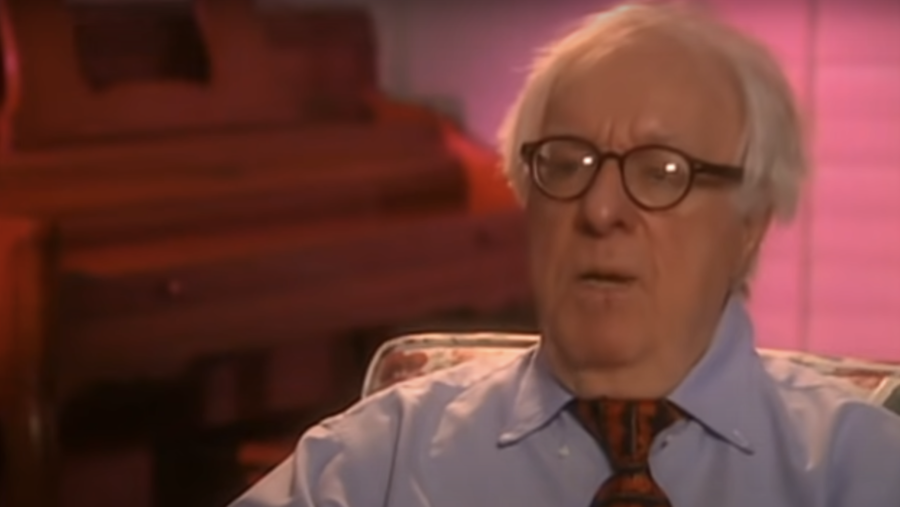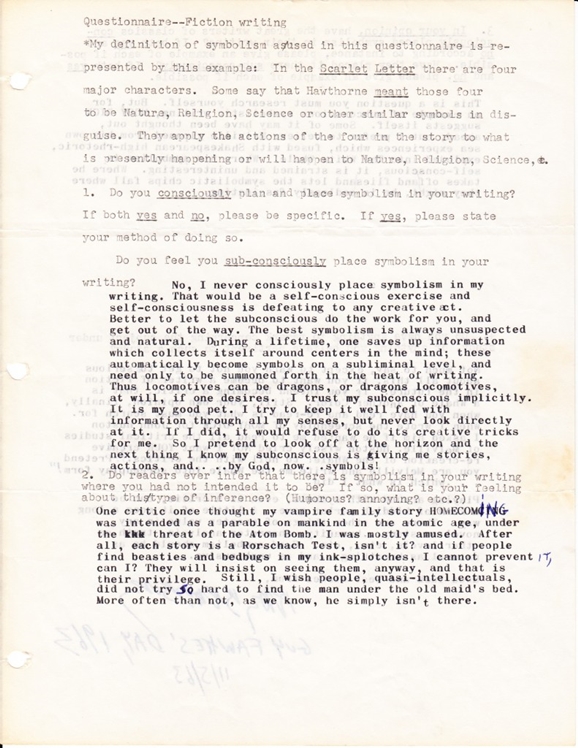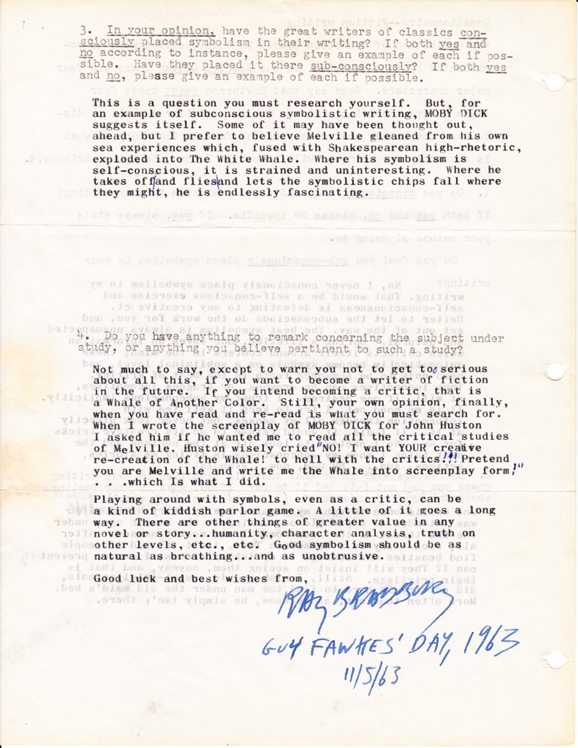See Ray Bradbury’s Amazing Response To A Student’s Questions About Symbolism

Ray Bradbury is an absolute hero. In our ridiculously connected digital age, it’s easy to take for granted the level of interactions fans can have with the creative talents they admire. These days, you can follow the Twitter feed of your favorite writers, watch behind-the-scenes videos from popular filmmakers, or even grill them directly during one of Reddit’s AMAs (Ask Me Anything).
But it’s not that long ago that your interactions with your favorite writers were limited to running into them in person or actually writing a letter…the non-electronic kind (ask your parents, kids). That’s precisely what sixteen-year-old San Diego student Bruce McAllister did in 1963, and one of science fiction’s most beloved writers, Ray Bradbury, took the time to respond.
Amusingly enough, McAllister’s experiment originated in an argument between him and his English teacher. Like many a petulant student before, McAllister thought his teacher’s tendency to extrapolate symbolism out of books was generally applying hidden meanings that weren’t the writers’ intent.
In order to prove that writers weren’t hiding elaborate symbolic meanings in every damn paragraph, McAllister wrote to a whopping 150 popular writers of the era, including Jack Kerouac, Ralph Ellison, John Updike, and Norman Mailer. Seventy-five of them replied, including — most important for our purposes — Ray Bradbury.
Much to Ray Bradbury’s credit, the beloved writer sent back two typed pages in response to McAllister’s questions. You can see both pages — as well as retyped versions in case you have trouble reading the text on the images — below.

Do you consciously plan and place symbolism in your writing? If both yes and no, please be specific. If yes, please state your method of doing so. Do you feel you subconsciously place symbolism in your writing?
No, I never consciously place symbolism in my writing. That would be a self-conscious exercise and self-consciousness is defeating to any creative act. Better to let the subconscious do the work for you, and get out of the way.
The best symbolism is always unsuspected and natural. During a lifetime, one saves up information which collects itself around centers in the mind; these automatically become symbols on a subliminal level, and need only to be summoned forth in the heat of writing. Thus locomotives can be dragons, or dragons locomotives, at will, if one desires.
I trust my subconscious implicitly. It is my good pet. I try to keep it well fed with information through all my senses, but never look directly at it. If I did, it would refuse to do its creative tricks for me. So, I pretend to look off at the horizon and the next thing I know my subconscious is giving me stories, actions, and… by God, now… symbols!
Do readers ever infer that there is symbolism in your writing where you had not intended it to be? If so, what is your feeling about this type of inference? (Humorous? annoying? etc.?)
One critic once thought my vampire family story HOMECOMING was intended as a parable on mankind in the atomic age, under the [illegible] threat of the Atom Bomb. I was mostly amused. After all, each story is a Rorschach Test, isn’t it? and if people find beasties and bedbugs in my ink-splotches, I cannot prevent it, can I?
They will insist on seeing them, anyway, and that is their privilege. Still, I wish people, quasi-intellectuals, did not try so hard to find the man under the old maid’s bed. More often than not, as we know, he simply isn’t there.

In your opinion, have the great writers of classics consciously placed symbolism in their writing? If both yes and no according to the instance, please give an example of each if possible. Have they placed it there subconsciously? If both yes and no, please give an example of each if possible.
This is a question you must research yourself. But, for an example of subconscious symbolistic writing, MOBY DICK suggests itself. Some of it may have been thought out ahead, but I prefer to believe Melville gleaned from his own sea experiences which, fused with Shakespearean high-rhetoric, exploded into The White Whale.
Where his symbolism is self-conscious, it is strained and uninteresting. Where he takes off and flies and lets the symbolistic chips fall where they might, he is endlessly fascinating.
Do you have anything to remark concerning the subject under study, or anything you believe pertinent to such a study?
Not much to say, except to warn you not to get too serious about all this, if you want to become a writer of fiction in the future. If you intend on becoming a critic, that is a Whale of Another Color. Still, your own opinion, finally, when you have read and re-read is what you must search for.
When I wrote the screenplay of MOBY DICK for John Huston I asked him if he wanted me to read all the critical studies of Melville. Huston wisely cried, “NO! I want YOUR creative re-creation of the Whale! to hell with the critics!!! Pretend you are Melville and write me the Whale into screenplay form!” … which is what I did.
Playing around with symbols, even as a critic, can be a kind of kiddish parlor game. A little of it goes a long way. There are other things of greater value in any novel or story…humanity, character analysis, truth on other levels, etc., etc. Good symbolism should be as natural as breathing…and as unobtrusive.
I imagine young McAllister strutting back into his English teacher’s room, slapping Ray Bradbury’s response down on the desk, and saying, “See? Told ya.” I wonder if the smug little bastard celebrated his victory in detention…
At any rate, Ray Bradbury’s response letter is an intriguing footnote in science fiction history, and Bradbury earns even more of my respect for taking the time to respond to McAllister at length. Especially since the kid’s questions were a bit reductive and repetitive.
His response is classic Ray Bradbury, showcasing both his sharp mind and his wonderful command of language. Even when he’s breaking things down into somewhat technical form, he still manages to work in his own beautiful imagery and turns of phrase.
You can read more writer responses to McAllister’s questions over at The Paris Review. Bradbury is the only genre writer whose full response is reprinted in full, but they do include one brief reply from Isaac Asimov, responding to whether he used symbolism in his works consciously: ”Consciously? Heavens, no! Unconsciously? How can one avoid it?”












